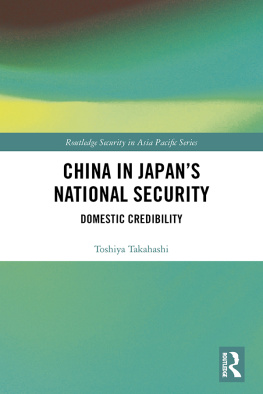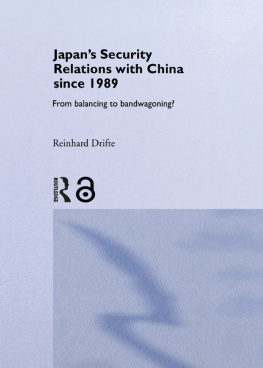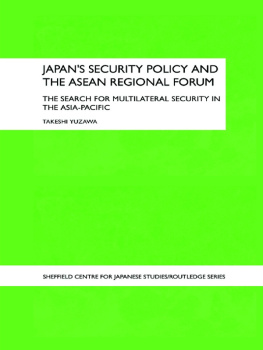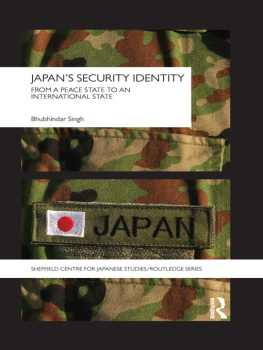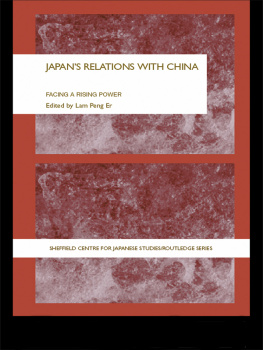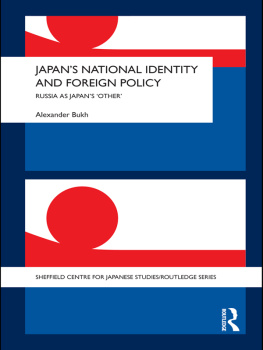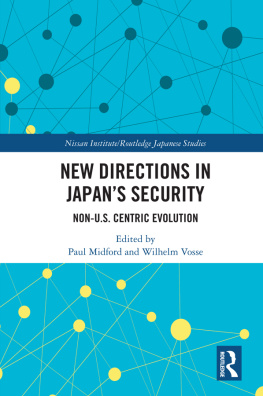China in Japans National Security
This book explores Japans emerging national security policy in relation to China. It considers the rise of nationalism in contemporary Japan, the recent actions of the Abe government to change Japans security policy course and the importance of domestic views, both elite and popular, about safety and credibility in shaping security policy. It highlights the lack of strong links between China and Japan and the existence in Japan of significant misconceptions about China. It discusses the politics of Japans alliances, examines the growth of national pride in Japan and of a more confrontational attitude toward China, and concludes by putting forward some scenarios for likely future developments and some policy proposals for a stable JapanChina relationship.
Toshiya Takahashi is an Associate Professor at Shoin University, Japan.
Routledge Security in Asia Pacific Series
Series Editors
Leszek Buszynski
Strategic and Defence Studies Centre, the Australian National University
and
William Tow
Australian National University
Security issues have become more prominent in the Asia Pacific region because of the presence of global players, rising great powers, and confident middle powers, which intersect in complicated ways. This series puts forward important new work on key security issues in the region. It embraces the roles of the major actors, their defense policies and postures and their security interaction over the key issues of the region. It includes coverage of the United States, China, Japan, Russia, the Koreas, as well as the middle powers of ASEAN and South Asia. It also covers issues relating to environmental and economic security as well as transnational actors and regional groupings.
The New US Strategy towards Asia
Adapting to the American pivot
Edited by William T. Tow and Douglas Stuart
Vietnam and the South China Sea
Politics, Security and Legality
Do Thanh Hai
Japans Search for Strategic Security Partnerships
Edited by Gauri Khandekar and Bart Gaens
Geopolitics and the Western Pacific
China, Japan and the US
Leszek Busznski
The South China Sea
From a Regional Maritime Dispute to Geo-Strategic Competition
Edited by Leszek Buszynski and Do Thanh Hai
China in Japans National Security
Domestic Credibility
Toshiya Takahashi
China in Japans National Security
Domestic Credibility
Toshiya Takahashi
First published 2020
by Routledge
2 Park Square, Milton Park, Abingdon, Oxon OX14 4RN
and by Routledge
52 Vanderbilt Avenue, New York, NY 10017
Routledge is an imprint of the Taylor & Francis Group, an informa business
2020 Toshiya Takahashi
The right of Toshiya Takahashi to be identified as author of this work has been asserted by him/her/them in accordance with sections 77 and 78 of the Copyright, Designs and Patents Act 1988.
All rights reserved. No part of this book may be reprinted or reproduced or utilized in any form or by any electronic, mechanical, or other means, now known or hereafter invented, including photocopying and recording, or in any information storage or retrieval system, without permission in writing from the publishers.
Trademark notice: Product or corporate names may be trademarks or registered trademarks, and are used only for identification and explanation without intent to infringe.
British Library Cataloguing-in-Publication Data
A catalogue record for this book is available from the British Library
Library of Congress Cataloging-in-Publication Data
A catalog record has been requested for this book
ISBN: 978-1-138-47796-4 (hbk)
ISBN: 978-1-351-10369-5 (ebk)
Typeset in Times New Roman
by Wearset Ltd, Boldon, Tyne and Wear
To my teachers in my life and Japanese and Chinese friends and students
Contents
This book by Toshiya Takahashi is very timely and the first of its kind. The concept of national security is very new for Japan where pacifism has been the dominant ethos. The Japanese had little need of national security while they benefited from the protection of the American alliance. Though that was the case for at least six decades after the Pacific War, times have changed. Japan now faces an assertive China that has pressed its claim to the Senkaku/Diaoyu islands and the surrounding maritime area. A Japanese leadership has emerged under Shinzo Abe that has strengthened Japans naval capability and its capacity to respond to Chinese pressure in this maritime dispute. In this book, Takahashi explains that national security requires domestic credibility for its effectiveness, that is, it requires public support. It should not divide and polarize the public as the Abe government has done under what Takahashi calls the influence of Japans neo conservatives. Takahashi argues that the Abe government has gone too far in creating a culture of national security and in rousing a nationalism that prevents a pragmatic resolution of these maritime disputes with China. As a rising scholar on Japan, Takahashi has been disturbed by the nationalist forces that have influenced the Abe government in relation to China. For him, this is reminiscent of an ugly period in Japans history when extreme and virulent nationalism was allowed a free hand. This apprehension he shares with many others in Japan and though they may concede that the pacifism of the past may provide no answer to Japans current security situation, they are uncomfortable with the direction the Abe government has taken. In this book, Takahashi has adopted a very scholarly and erudite approach to the subject of Japans national security, but the argument is clear. The book lucidly demonstrates the importance of public support for national security that cannot exist separately or disconnected from public concerns. There are copious and extensive references both in Japanese and English and the sources have been meticulously documented. For those interested in the subject of Japanese security, this is an important book and should be on the reading list.
Leszek Buszynski
Series editor
This book is a product of my long and sometimes uncharted journey which was obviously hard but made me deeply engaged in the realities of human life. It is based upon my PhD research (201215) in National Security College, the Australian National University (ANU), but my journey to this book was full of trials and tribulations. What helped and enabled me to survive on this journey were numerous people most of whose names I am afraid cannot be mentioned here.
When I was in my twenties, I spent almost a decade curing my illness and I lost my chances to have work in the public sector or the business world. Despite this predicament, a Japanese doctor who was a pioneer in Chinese medicine in Japan saved my life. After the recovery, I restarted my life as a graduate student (Masters course) of the International University of Japan (IUJ) where I met, for the first time, International Relations (IR). In my IUJ days (199294), though I was a novice in this discipline, I had precious time to take courses by Professor Kalevi J. Holsti (University of British Columbia), Barry Buzan (then, the University of Warwick) and late Chihiro Hosoya (IUJ), Akira Irie (Harvard University) and other faculty members. This experience opened up my sleeping brain and changed my life completely. However, this was not obviously the start of academic research. After graduation, I met Professor Leszek Buszynski there. This was the real start of my research. He became my best teacher for all of my academic life thereafter.


